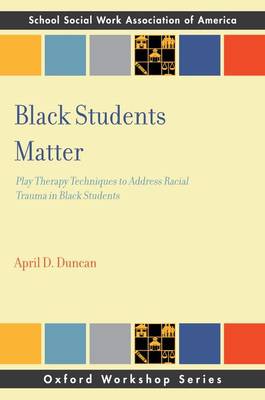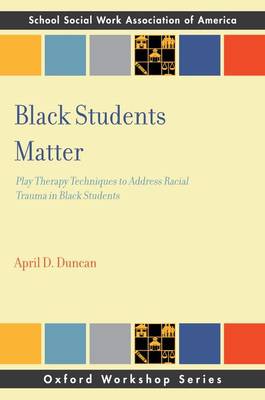
- Retrait gratuit dans votre magasin Club
- 7.000.000 titres dans notre catalogue
- Payer en toute sécurité
- Toujours un magasin près de chez vous
- Retrait gratuit dans votre magasin Club
- 7.000.0000 titres dans notre catalogue
- Payer en toute sécurité
- Toujours un magasin près de chez vous
Black Students Matter
Play Therapy Techniques to Support Black Students Experiencing Racial Trauma
April D Duncan
50,45 €
+ 100 points
Description
From slavery in the 19th century to racial disparities in school discipline that push them into the juvenile justice system, historically Black children have been denied a childhood. While schools are tough on Black children, Black caregivers often use "tough love" to prepare them for the world they will encounter. But if everyone is tough on Black children, who is gentle with them? Who allows them to be children? This book helps mental health professionals understand how racism, prejudice and discrimination contribute to mental health and behavioral issues in Black students that lead to high rates of school discipline, also known as the Preschool-to-Prison Pipeline. It explores how bias shapes the way the behaviors and moods of Black children are often misinterpreted and punished through unfair and subjective disciplinary methods. Mental health professionals are challenged to advocate for the mental health needs of Black students by using play therapy to engage caregivers, teachers, and administrators in providing culturally responsive support and nurturance to enhance their relationships with Black children. Using music, art, sand, and other expressive therapies, the book provides over 30 unique interventions for Black students of all ages to heal from racial trauma. The activities allow Black children the opportunity to process issues they encounter, like colorism and hair discrimination, while learning healthy skills to manage the trauma, anxiety, and depression that often results from their daily exposure to racial stress. The book is to help empower mental health professionals to feel more competent and comfortable to support the unique needs of Black students and pass that knowledge on to the adults in the lives of Black children and allow Black children to reclaim their childhood.
Spécifications
Parties prenantes
- Auteur(s) :
- Editeur:
Contenu
- Nombre de pages :
- 520
- Langue:
- Anglais
- Collection :
Caractéristiques
- EAN:
- 9780197669266
- Date de parution :
- 17-01-24
- Format:
- Livre broché
- Format numérique:
- Trade paperback (VS)
- Dimensions :
- 160 mm x 226 mm
- Poids :
- 725 g

Les avis
Nous publions uniquement les avis qui respectent les conditions requises. Consultez nos conditions pour les avis.






